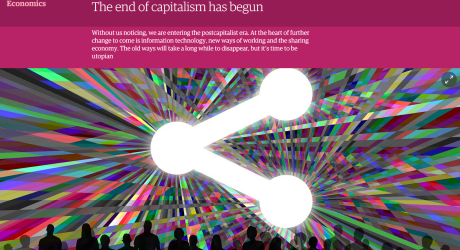July 25, 2015
In The Guardian article, The end of capitalism has begun, Paul Mason presents an economic spin on how IT shaped our past and could possibly shape our future. Yes, it’s always been disruptive and will only become more so.
Reviewing the impact of past social, economic, and historical events invites reflection, it’s becoming clear that our thinking has changed and is changing, and therefore we are changing in some very fundamental ways. Steve Denning commented in Forbes Jul 20, 2015 and asked, “Is Capitalism Ending?”
We constantly change the machines and the machines constantly change us… how we live, work, and interact. Old business systems and their operations models are still using old hardware and outdated software — literally old tech in some instances, but more importantly, the thinking which created them is outdated. It’s becoming obvious there needs to be an update.
Emerging tech and the individuals driving it are bringing solutions that will disrupt and force the models to change. Individuals and small groups in IT have tools today that just a few years ago, only the largest organizations could access: development tools, production tools, delivery tools, marketing tools. Now free or very affordable, doors are swinging open to build better mousetraps… or more likely, better and more socially responsible solutions to old problems. And the new mousetraps are disrupting the old ways of doing business.
Some efforts are global and beyond in scale, for example, Elon Musk and his ventures. Other efforts are very local, or even when organized to a corporate international level, implemented by individuals and small groups at the local level.
And tech is the enabler, the game changer. ‘Buy local’ gets a boost from enabling app tech and social media promotion. Airbnb, a ‘new’ cheaper and more personal hotel alternative looks a lot like homestay when traveling in the 1800s — except for the way it is booked. Uber and other ride sharing services create entrepreneurial income for some as they deliver services that customers swear are superior… and here the market rules. If they weren’t, would they be used?
It’s a new form of capitalism that’s emerging, or is it? Because it’s not access to cheap resources that is driving innovation and new production, it’s grassroots and individual visionaries, often collaborating and working together with others in new ways.
No doubt about it, as William McGurn pointed out, “innovative new business models always threaten traditional constituencies” and “the thought that there might be some nonsexual for-profit contracts between consenting adults keeps progressives up at night”… and it’s not just progressives that are uncomfortable.
Back to Mason:
“As with the end of feudalism 500 years ago, capitalism’s replacement by postcapitalism will be accelerated by external shocks and shaped by the emergence of a new kind of human being. And it has started.
Postcapitalism is possible because of three major changes information technology has brought about in the past 25 years. First, it has reduced the need for work, blurred the edges between work and free time and loosened the relationship between work and wages. The coming wave of automation, currently stalled because our social infrastructure cannot bear the consequences, will hugely diminish the amount of work needed – not just to subsist but to provide a decent life for all.
Second, information is corroding the market’s ability to form prices correctly. That is because markets are based on scarcity while information is abundant. The system’s defence mechanism is to form monopolies – the giant tech companies – on a scale not seen in the past 200 years, yet they cannot last. By building business models and share valuations based on the capture and privatisation of all socially produced information, such firms are constructing a fragile corporate edifice at odds with the most basic need of humanity, which is to use ideas freely. Third, we’re seeing the spontaneous rise of collaborative production: goods, services and organisations are appearing that no longer respond to the dictates of the market and the managerial hierarchy. The biggest information product in the world – Wikipedia – is made by volunteers for free, abolishing the encyclopedia business and depriving the advertising industry of an estimated $3bn a year in revenue.”
The takeaway lines:
- a new layer of reality centred on information
- emergence of a new kind of human being
- impact from the coming wave of automation
- market’s inability to form prices correctly
- spontaneous rise of collaborative production
